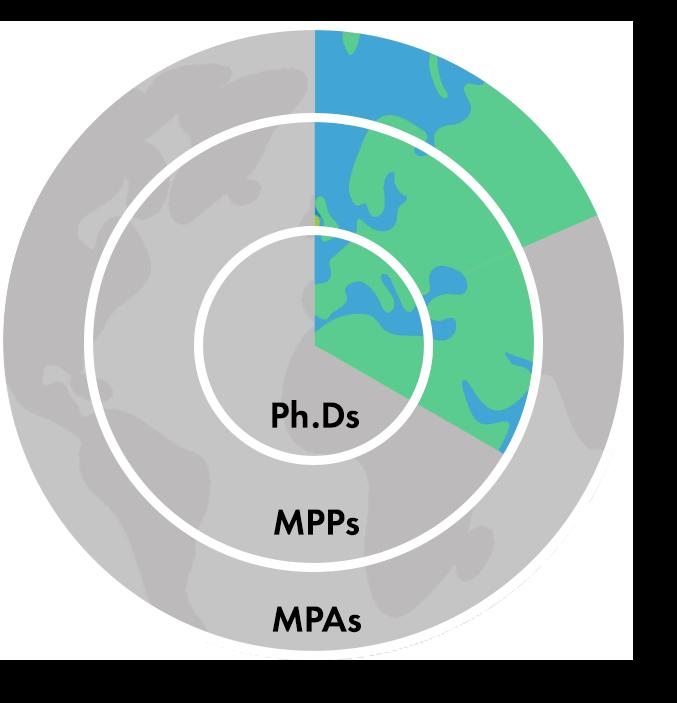spia.princeton.edu/about/annual-report
RESEARCH.
Public policy research in the 21st century demands a respect for evidence, a global perspective, and a multiplicity of voices.
Our faculty are among the top minds in their academic fields. They bring together teaching and research in economics, politics, sociology, psychology, the natural sciences, history, and several other disciplines. They conduct path-breaking research, producing evidence-based analysis that contributes to important policy debates. Our 21 centers and programs help organize their research interests.
“As a first-generation American, I’ve always wanted to give back to the country where my parents made their life.”
- Ashwin Mahadevan ’22
“I feel replenished and enriched by being around my peers at Princeton, who are public service souls.”
- Hua Qu MPP ’21
“To me, politics and policymaking are for the people. I’d like to illuminate and improve the economic levers of power that touch all of our lives in ways most of us are unaware.”
- Joshua Seawell MPA ’22
“I don’t have a policy background, but I have always suspected it might suit me. I saw this as a place where I could be most flexible. Now this is just me, my show.”
- Oladoyin Phillips ’14, Ph.D. Candidate, STEP
OUR STUDENTS.
UNDERGRADUATE STUDENTS
Our undergraduate concentrators are interested in public service and leadership in the world of public and international affairs. The program gives them the tools, the understanding, and the habits of mind necessary to pursue policy problems of their choosing.
GRADUATE STUDENTS
Our graduate students are extraordinary and engaged leaders from the U.S. and across the globe. Through our programs, they have incredible access to world-renowned faculty and policy practitioners. Generous financial support allows students to focus on their studies and pursue careers in public affairs.
OUR CURRICULUM.
1
The Undergraduate Concentration is designed to prepare students for a range of career paths. The major allows for a significant amount of customization, but with the structure and guidance needed for an education that is both broad and deep.
2
The Master in Public Affairs is a twoyear, full-time residential program offering rigorous preparation and interdisciplinary training for international and domestic public policy careers. Students choose one of four fields of study: domestic policy, economics and public policy, international development, or international relations.
3
4
The Master of Public Policy is a oneyear, full-time residential program for midcareer professionals who are emerging leaders in international and domestic public affairs.
The Ph.D. in Public Affairs offers two research clusters: Security Studies; and Science, Technology, and Environmental Policy (STEP). Graduates pursue careers in academia, government agencies, policy think tanks, nonprofit agencies, and in the private sector.
“Our rigorous graduate curriculum provides students with the policy toolkit they need to become effective changemakers.”
— Amaney Jamal, Dean
This year, in light of continuing racial inequities, the MPA Review Committee paid special attention to how SPIA can better incorporate issues of diversity, equity, and inclusion (DEI) throughout our core curriculum.
The committee recommended and the faculty approved a new required halfterm course on race, power, and inequality that will meet during the MPA summer program. This course will allow incoming MPA students to develop the necessary context for addressing DEI issues throughout their studies at Princeton. It will also supplement the half-term DEI course requirement approved last year.
In addition, the committee identified areas in the existing core courses that warrant greater attention to asymmetries of power, stratification, and structural inequalities. The School has organized new faculty teams who will draw on feedback from the MPA Core Curriculum Review surveys to revamp the content, structure, and overall approach to the following core courses:
•SPI 501: Politics of Public Policy
•SPI 502: Psychology for Policy Analysis and Implementation
•SPI 511b and 511c: Microeconomic Analysis
Photo by : Imaan Khasru ‘23
FACULTY PODCASTS.
A weekly political show hosted by Julian Zelizer & Sam Wang
48 Episodes
150.2K Downloads
A
4 Episodes
1K Downloads
ADMITTED STUDENTS.
Fields of Concentration
U.S. Students of Color
“Training the next generation of policy experts is the foundational goal of our School. In the face of a global pandemic and other pressing policy challenges, what SPIA accomplished this year — under the leadership of Cecilia Rouse, Mark Watson, and Nolan McCarty — has never been more important. In this critical moment, I am honored to serve as the School’s next dean and remain committed to academic excellence and applied state-ofthe-art policy training.”
— Amaney Jamal, Dean Princeton School of Public and International Affairs






























